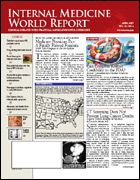Publication
Article
Internal Medicine World Report
How to Avoid Medication Errors in Outpatient Surgery
Communicate with Patients When Prescribing Antibiotics, CNS Drugs
Of the more than 11,000 medication errors reported in the perioperative setting in 2005, 5% resulted in harm to the patient, including 4 deaths, according to the 7th annual national MEDMARX Data Report from the United States Pharmacopeia (USP) Center for the Advancement of Patient Safety, Rockville, Md. Some 2437 of the medication errors occurred in the outpatient surgery setting.
The USP is an independent, nonprofit national organization that sets standards for all prescription and other healthcare products manufactured and sold in the United States. It also operates MEDMARX, a Web-based program that hospitals and related institutions subscribe to and use to anonymously report, track, and analyze medication errors. Since MEDMARX was established in 1998, it has received more than 1.2 million reports of medication errors from more than 870 healthcare facilities in the United States.
Physician?Patient Communication
The most frequently cited medications associated with errors were antibiotics and central nervous system (CNS) drugs. CNS agents were most often involved in errors that resulted in harm to the patient (defined as impairing the patient's physical, emotional, or psychological well-being or causing pain). Analysis of the errors identified poor communication between the physician and the patient as one of the leading causes.
"The communication between a primary care provider and a surgeon has to be very clear," says Rodney W. Hicks, PhD, manager, Patient Safety Research, USP Center for the Advancement of Patient Safety, and coauthor of the MEDMARX report. "Good communication about the medications the primary care physician has prescribed for the patient is needed, so the surgeon doesn't accidentally discontinue needed medications, like blood pressure medications or insulin."
Common Errors and Causes
The 3 most common types of medication errors in the outpatient surgery setting in 2005 were:
1. Prescribing errors, for example, leaving out the dosage or duration on the prescription order, or ordering a contraindicated drug (eg, an antibiotic that the patient is allergic to)
2. Omission errors, such as omitting a dose, or not giving preprocedural antibiotics (which has been associated with increased risk for surgical-site infections) or not giving preoperative benzodiazepines (which can interfere with the anesthesia plan)
3. Improper dose or quantity of the prescribed drug.
Together, these 3 errors accounted for as many as 66% of the outpatient surgery medication errors. Some 3.3% of the 2437 medication errors resulted in harm to the patient. Life-sustaining interventions were required in 3 cases, but no deaths were reported.
Familiarity with medications most frequently associated with errors (Table) and using extra care when prescribing them can significantly reduce future errors.
The leading causes of medication errors reported in the outpatient surgery setting were:
Performance deficit
? , in which the individual involved knows what to do but does not do it correctly (eg, ordering a dose of 100 mg instead of the correct dose of 10 mg)
Procedure/protocol
? not followed, because of unfamiliarity with existing procedures or human error, such as not checking the patient's records for drug allergies
Communication problems
? , for example, an order for a preoperative antibiotic was called in but was never recorded in the patient's paperwork, or a patient's antihypertensive regimen was discontinued.
Role of the Primary Care Physician
In tandem with the MEDMARX report, the USP issued a list of tips for patients who are facing surgery. Using this list can help minimize the patient's risk of falling victim to medication errors.
IMWR
"Certainly the more times the patient hears this kind of information, the better," Diane D. Cousins, RPh, coauthor of the report, tells . And just telling them once may not be enough. "They've already been through the doctor's office, but they still don't really have a good recollection about what they were told, because they were upset about hearing that they have to have surgery."
Ms Cousins, who is vice president of the USP Center for the Advancement of Patient Safety, stresses the need to "reinforce the importance of preparing for surgery."
Primary care physicians should also invite patient questions and ensure that the patient understands what to expect and what the procedure will involve. Also tell them whether they should continue to take their prescribed medications. "That's always a question," Ms Cousins says. "The instructions they receive from their surgeon may say, ?Don't take anything after midnight,' and then the patient doesn't have surgery until 1 o'clock in the afternoon. What do they do about their morning dose of medication?"
Physicians also play an important role in their patients' postoperative care. "Following surgery, patients are often unsure about how and when to resume taking their chronic medications," Ms Cousins points out. "The surgeon's discharge instructions usually instruct the patient to follow up for postop care with the surgeon but not necessarily to follow up with their primary care physician to find out when they should resume taking their medications," she says.
How to prevent medication errors in outpatient surgical patients
? Create checklists that can be completed before patients leave the area so that information will not be lost through handoffs
? Use extra care when prescribing medications associated with high risk for harm (eg, midazolam, fentanyl, morphine)
? Encourage patient participation in presurgical safety procedures, such as preregistration and marking the surgical site
? Develop strategies to ensure that medications, particularly antibiotics, are given at the correct time
? Develop strategies to identify and communicate clinical information, including allergies, to all members of the perioperative team
? Expand the pharmacy department's role in the perioperative process, including medication reconciliation (ie, comparing a list of the medications the patient is taking with what was ordered) and standardizing the medication formulary or limiting the number of product concentrations available for use
? Give the patient a list of recommendations on how to avoid errors before surgery.






